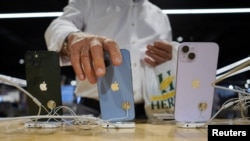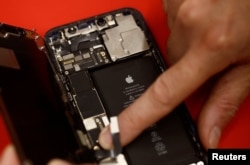Belgium says it plans to study possible health risks from electromagnetic radiation release by Apple’s iPhone 12 smartphone.
Belgium’s move comes after French regulators ordered Apple to stop selling the iPhone 12. French officials said the phone creates more electromagnetic radiation than the European Union permits. Apple disputes this. The company said the device meets all requirements.
The French government agency that oversees wireless communications frequencies said it issued the order after the phone failed one of two tests. The tests are related to the amount of electromagnetic waves the body can absorb.
Apple released the iPhone 12 in late 2020. It is unclear why the phone did not pass the agency’s latest tests or why only the iPhone 12 is affected.
France’s digital minister said the iPhone 12’s radiation levels are still much lower than levels that scientific studies found could harm users. The French agency said its tests do not test normal phone use.
The National Frequency Agency on Tuesday called on Apple to use all means to fix the problem for phones already in use. It said it would study updates to the phones. If they do not work, “Apple will have to recall” phones that have already been sold, it said.
The agency recently tested 141 cellphones. It found that when the iPhone 12 is held in a hand or near the body, its level of electromagnetic energy absorption is 5.74 watts per kilogram. That is higher than the EU requirement of 4 watts per kilogram or less.
Watts per kilogram is a measure of the rate at which energy is absorbed by the body.
The phone passed a separate test of radiation levels for devices kept in heavy clothes or in a container, the agency said.
Malcolm Sperrin is director of medical physics at Britain’s Royal Berkshire hospital group. He said the radiation limits are set well below the level at which harm will happen. He said a small increase above those limits is unlikely to affect a person’s health.
Users of the iPhone 12 should be able to download an update that prevents the radiation from going above the limit, Sperrin said.
It is not clear why this model appears to release higher radiation. But it might be related to when the phone is seeking a connection to send or receive signal, he said.
The World Health Organization says it has not found any harm to health caused by the use of mobile phones. Apple said the iPhone 12 has been approved by many international bodies and meets requirements for radiation around the world.
Other country’s responses
Belgium’s latest action on the phone raises the possibility that other European countries might ban the model after France.
Italy said it would take no steps for now. But Germany’s network regulator BNetzA said that the work in France could act as a guide for Europe. The agency said that it might reconsider the smartphone for the German market if the situation progresses in France.
A Dutch digital organization said it was looking into Apple’s phone and would ask the U.S. company for an explanation. But it said that there was no immediate risk.
Britain has not announced any plans after France’s decision.
I’m Gregory Stachel.
Gregory Stachel adapted the story for VOA Learning English using material from The Associated Press and Reuters.
________________________________________________
Words in This Story
frequency –n. the measure of radio waves used for communications
regulate – v. to make rules or laws that control (something)
absorb – v. to take in (something, such as a liquid) in a natural or gradual way
digital – adj. using or characterized by computer technology
update – n. a change or addition to computer software that includes the most recent information
recall – v. to ask people to return (a product with a defect or problem)







Forum